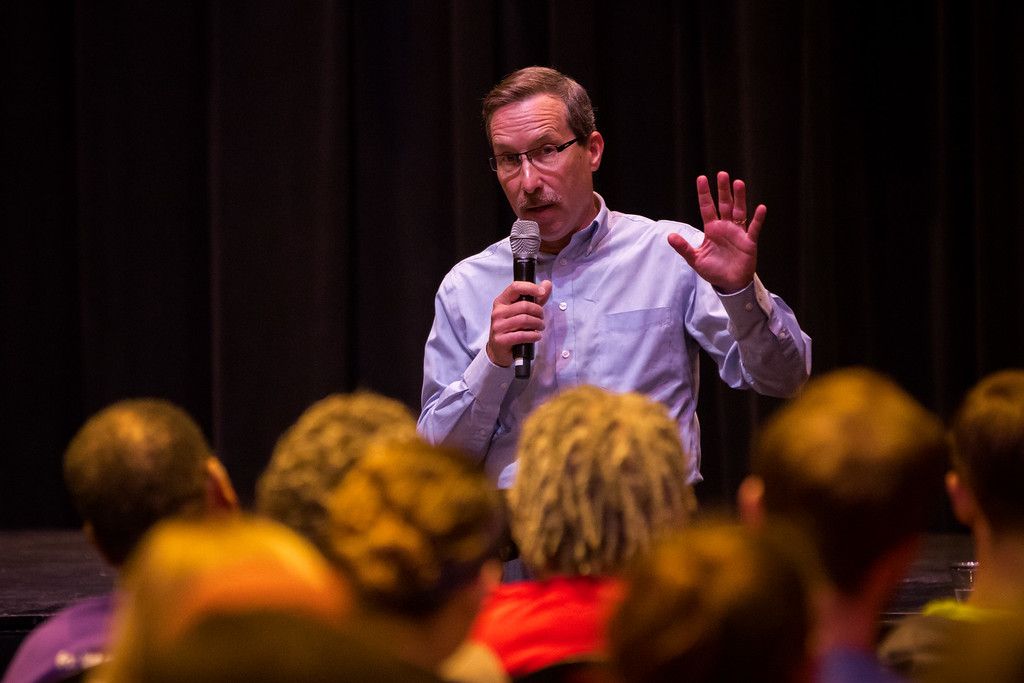by Bruce T. Gourley
Published October/November 2016
(Baptist Studies Bulletin Archives Index)

There has never been a president as unsuitable for the presidential office as Donald Trump.
He was by far the greatest liar this presidential election season (and perhaps the greatest liar of any president, ever). His illegal and unethical business practices have resulted in some 4,000 lawsuits. He is a thrice-married sexual predator, boasting of his predation, and often demeaning women he’s not assaulting. He is a Wall Street billionaire who thinks he is smart for using Wall Street-created loopholes to avoid paying any federal taxes, implying the stupidity of those who do pay taxes. He ran a campaign of hate and racism, garnering the endorsement of the KKK, Nazis and communist Russia.
In short, Donald Trump is the exact opposite of what Christian parents teach their children, and of how they raise their children. He is the evil man the Bible warns about. He is the exact opposite of the values that are preached in our nation’s schools, of the words that adorn elementary school hallways: kindness, compassion, patience, respect for others.
He is the hateful bully, the lifetime con man, soon to ascend to the White House.
And yet, some 80% of voting white evangelicals cast their ballots for an obviously evil man. Why?
Why, in many evangelical churches across America, are white Christians singing the praises of a pathological liar and sexual predator?
Why do the overwhelming majority of white evangelical Christians view Trump as their political savior? What is he saving them from?
At the same time and across the evangelical isle, only 15% of voting minority evangelicals cast ballots for Trump, while only 8% of voting African Americans cast ballots for Trump. (The percentage of African Americans who are Christian is larger than any other ethnic group in America, and some 40% of all African Americans are Baptist.)
Minorities (evangelicals and otherwise) in America are living in fear of the president elect’s racist and hateful rhetoric, of the racists and white nationalists Trump has chosen for the nation’s most powerful administrative posts, and of the sudden and steep rise in hate crimes against minorities by the KKK, Nazis and white racists at large.
Why is there such a stark divide along racial and ethnic lines among Christians in America?
Or is this fault line nothing new whatsoever?
Early Baptists and other persecuted minorities of the New World strove for human freedom and equality. America was founded upon the aspirational vision of human equality, and the First Amendment to the U.S. Constitution in 1791 enshrined Baptist freedom principles of equal freedom of conscience and religious liberty for all.
Then came the hardening of racial divisions. While Northern Baptists and other evangelicals of the early 19th century gravitated toward abolitionism, the rising profitability of black slavery turned white evangelicals of the South against bodily equality. For the betterment of the white race, the enslavement of blacks became God’s will for an obviously inferior, darker race. In the embrace of evil the superior race sought to preserve their privilege and dominance.
Like other white denominations of the South, Baptists of the region split in 1845 from their Northern counterparts in order to preserve black slavery and white supremacy in perpetuity.
Many white evangelicals of the South considered abolitionism as completely abhorrent. One newspaper editor called abolitionism, and hence human equality and freedom for all, “the final antichrist.” Although the Civil War resulted in legal freedom for blacks, thereafter horrific evils such as the deadly terrorism of Jim Crow and violent white opposition to the Civil Rights movement ensured the ongoing dominance of the white race.
Today, the early 18th-century evangelical split over human equality and freedom remains baked into the American ethos. Rather than a division North and South, the cleavage is urban and rural. Minority evangelicals, as well as non-evangelical Christians, typically live in urban areas and largely vote for human equality. The white evangelical majority, clustered outside of America’s large cities, are more concerned about their own freedoms.
As for Trump, many white evangelicals who embrace him do so primarily out of religious convictions (not all do; an uneven economy and lack of good paying jobs drove many voters), believing the otherwise unacceptable president-elect will roll back recent human rights advances and reinforce the privileged status that white evangelicals have long enjoyed but now perceive as threatened.
Some things, it seems, haven’t changed much in evangelical life of the past 200 years. In America’s long-running evangelical warfare over human rights, the majority too often embrace evil in order to protect their privileges.
